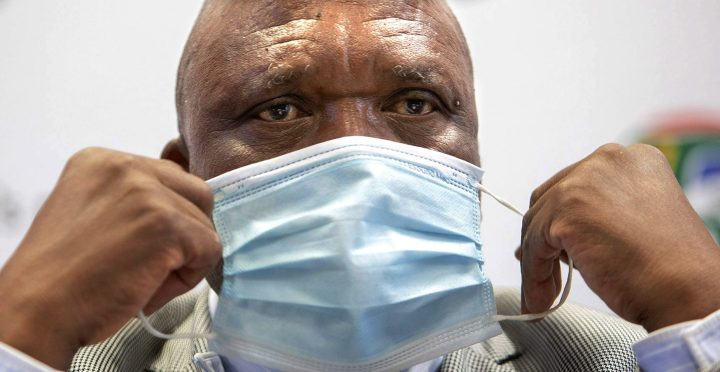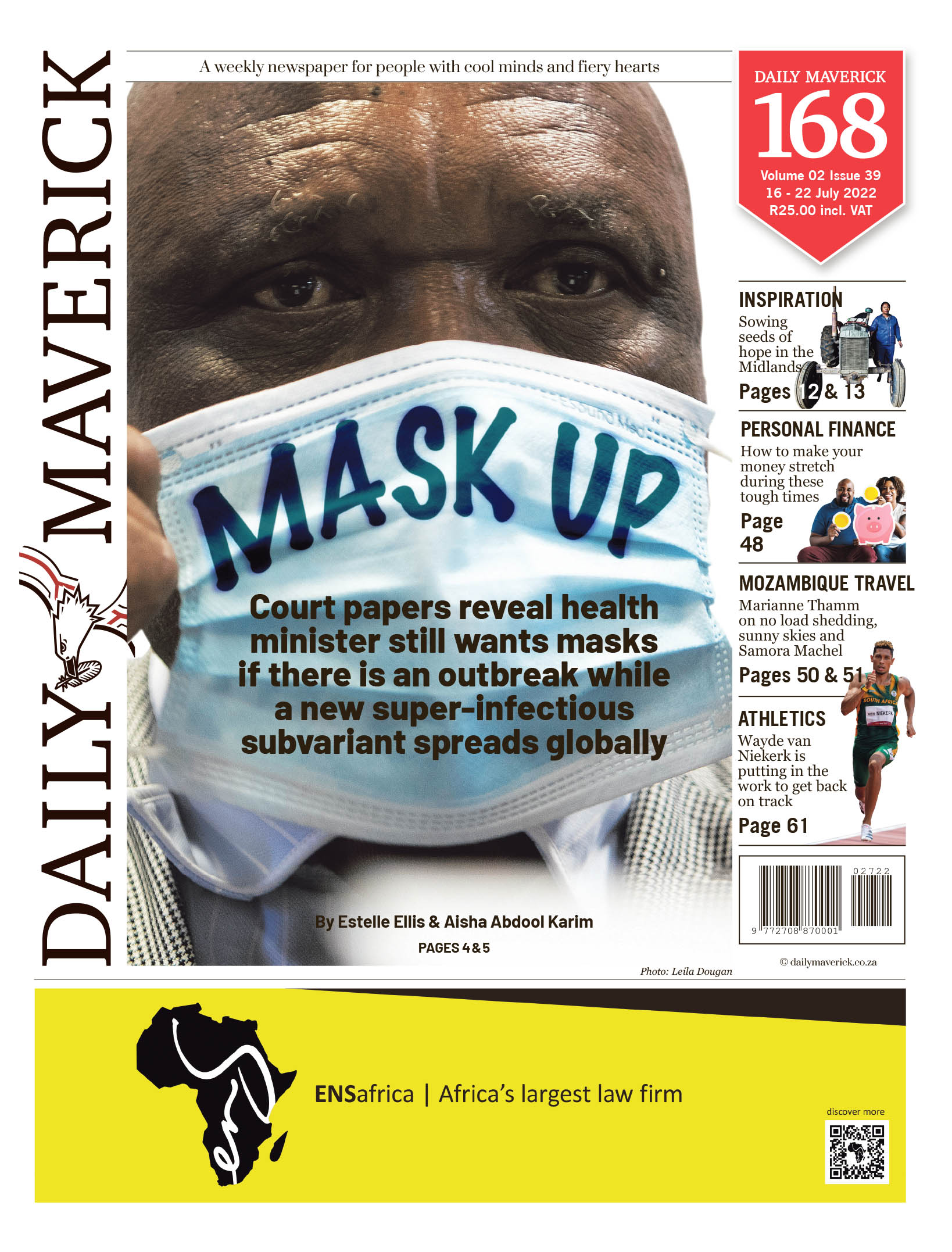CORONAVIRUS
Phaahla says mask mandate must remain a public health measure while world virologists express concern over scary Centaurus subvariant

Three weeks after the mask mandate was lifted, Covid-19 cases have not risen sharply, but Minister of Health Joe Phaahla says a mask mandate must remain available in case of future coronavirus waves.
As virologists around the world express concern about a new Covid-19 subvariant known as Centaurus, which is thought to be extremely transmissible with the potential to cause more severe disease, some of the 10 affected countries are reminding people to get vaccinated because the pandemic is not over.
BA.2.75 has been detected in 10 countries, including India, the UK, the US, Australia, Germany and Canada, and it has been designated as a “variant under monitoring” by the European Centre for Disease Prevention and Control.
In addition to its rapid growth and geographical spread, virologists are on alert, owing to the high number of extra mutations that Centaurus contains. The World Health Organization is closely monitoring the new variant. It has not been detected yet in South Africa, where, three weeks after the mask mandate was lifted, Covid-19 cases have not shown a marked increase and surveillance programmes are showing similar case numbers to the flu.

Shabir Madhi, Dean of the Faculty of Health Sciences at the University of the Witwatersrand. (Photo: Supplied)
The Dean of the Faculty of Health Sciences at the University of the Witwatersrand, Dr Shabir Madhi, said this week that the acute phase of the pandemic had passed and there was significant immunity against the disease in communities.
In other parts of the world, including parts of the US, the UK and Singapore, significant outbreaks driven by Centaurus and the BA.5 subvariant of Omicron have been noted in the past few weeks.
On 14 July at a press conference, the director of the World Health Organization, Tedros Ghebreyesus, said subvariants of Omicron, such as BA.4 and BA.5, continue to drive waves of cases, hospitalisation and death around the world.
He added that surveillance has reduced significantly – including testing and sequencing – making it increasingly difficult to assess the impact of variants on transmission, disease characteristics and the effectiveness of countermeasures.
But despite South Africa finding itself in a calmer moment, epidemiologists call this the “trough between waves”. Minister of Health Dr Joe Phaahla has filed an affidavit in the Pretoria High Court, saying that the option to introduce a new mask mandate must remain an available public health measure in case of another outbreak.
The court is expected to hear an application by several organisations, including AfriForum and Sakeliga, to have interim regulations, which included the mask mandate – which has since been repealed – declared unconstitutional.
Phaahla repealed the rules on 22 June, but Piet le Roux from Sakeliga said their case highlights a number of concerns they have.
After President Cyril Ramaphosa lifted the State of Disaster, first introduced in March 2020, in April 2022 a set of interim regulations remained in place, including a mask mandate, until permanent regulations could be promulgated. The promulgation of these permanent regulations, which many claimed was the result of a flawed public participation process, and others said was highly unconstitutional and draconian, was put on hold after Phaahla then extended the period for comment.
A set of interim regulations, including a mask mandate, was then put in place overnight. It is these regulations, among others, that are the subject of the court battle involving Phaahla. On 23 June, he again, in a late-night notice published in the Government Gazette, repealed these regulations, but the litigation is continuing.
Should Covid still be notifiable?
One of the main points of contention is Phaahla’s argument that Covid-19 must be listed as a notifiable medical condition, which makes it compulsory to report to the National Institute for Communicable Diseases (NICD) if someone tests positive for the virus.
Le Roux said in an affidavit before court that they believe Phaahla is insisting on having Covid-19 declared a notifiable medical condition to give himself the option of being able to trigger restrictive regulations that will provide him with similar powers to those Minister of Cooperative Governance and Traditional Affairs Dr Nkosazana Dlamini Zuma had under the State of Disaster that was declared in March 2020 and only lifted in April 2022.
In his affidavit before the Pretoria High Court, Phaahla said a mask mandate must remain available as a tool to fight a new outbreak of infections.
His main argument is that the court should not hear the case, as he has withdrawn the matter, but he also dealt with allegations by the organisations that the regulations, which extended the mask mandate and further imposed some restrictions on gatherings and entry and exit into the country, were “irrational, unjustifiable or not supported by science”.
“The regulation requires the wearing of masks in indoor public places and public transport. The science is clear that there is a significantly higher risk of infection in enclosed congregate settings and that masks, even cloth masks, limit transmission. The fact that masks are less effective against a variant such as Omicron does not mean that it has no effect at all or that it will be effective against a future variant,” he said.
“While masking in enclosed congregate settings may not become necessary during the troughs between waves and if Covid-19 becomes endemic, it is a public health measure that should be available in case of further waves,” he added.
“Although there has been a fifth wave of Covid-19 infections, it has turned out to be unexpectedly short-lived and neither as transmissible nor virulent as its predecessors… It is clear that the fifth wave has run its course,” Phaahla said.
He admitted that they had made an exception for schools in their mask mandate introduced in May because the “social and psychological impact on children is high and exacerbated by losing the connection with their peers and educators”, and the risk of developing severe disease remains low.
According to the NICD’s latest sequencing report, Omicron was the dominant variant, with 29% of Covid-19 cases caused by the Omicron variant BA.4 and 19% by BA.5.
In South Africa, where the two subvariants were identified as being the drivers behind a spike in infections in May and June, the weekly incidence risk is also way down. Gauteng has the highest numbers (an incidence risk of about six per 100,000) followed by the Western Cape (4.5 cases per 100,000 people).
Increases in cases have only been reported in the Free State and KwaZulu-Natal.
The number of people who are tested for Covid-19 symptoms is also down and the percentage of people testing positive (about 5% to 6%) remained largely unchanged.
“The immune landscape in South Africa is very complex,” said Dr Richard Lessells from the KwaZulu-Natal Research and Innovation Sequencing Platform, where Omicron was first identified. “Because we’ve had these five waves of infection and we’ve got vaccines, we’ve got this kind of complex mix of immunity.”
The country experienced a brutal wave driven by the Beta variant in the summer of 2020, a large wave driven by the Delta variant in the winter of 2021 and a very large Omicron wave in the summer of 2021/22.
We know that most people in South Africa have some kind of immunity to Covid by now. After two years and five waves, there have been almost 4 million confirmed cases. But this only represents people who have been tested. The NICD estimates that this is less than 10% of the actual number of Covid infections in the country. This means that more than two-thirds of the population could have some level of natural immunity to SARS-CoV-2.
Just more than half of South Africa’s adults have received at least one dose of a Covid-19 vaccine, according to the National Department of Health’s dashboard. The percentages for those fully vaccinated according to initial definitions and fully up to date with recommended boosters are lower.
Blood donor data published in a May preprint estimates that as many as 98% of people in South Africa had SARS-CoV-2 antibodies. One in 10 of these had protection solely from vaccination and no previous infection.
“In terms of South Africa and the kind of selection pressure for this virus now, any virus that’s going to gain an advantage in this context is going to be able to escape at least the immunity against infection,” Lessells explained.
“For BA.4 and BA.5 to spread in the way that they have, they had to have a property that allowed them to gain an advantage in the population. And that property was that they were a bit better at getting around the immunity in the population – particularly, they were a bit better at getting around the immunity that had been acquired from a BA.1 infection. So, that’s what allowed them to gain ground,” he added.
BA.4 and BA.5 were behind the spike in infections in South Africa during April and May that was classified as the fifth wave.
“Omicron had so many mutations and changes to its structure that essentially many of the antibodies that had been triggered by previous infection just didn’t recognise it,” says Professor Penny Moore, South African Research Chair of Virus-Host Dynamics at the University of the Witwatersrand and the NICD. “It was like Omicron was wearing a different coat altogether.”
Lessells added that, although the subvariants BA.4 and BA.5 have stemmed from the original Omicron that was circulating in South Africa, they still behave like a completely different virus.
Both subvariants have similar changes in their spike protein that evolved in similar ways that help them to get past immunity from both previous infection and vaccination, according to new research published in The New England Journal of Medicine.
Although the Omicron variants behind South Africa’s fourth wave were already proving quite a challenge, the BA.4 and BA.5 sublineages are even trickier, as studies have shown that, even if you had one of the other variants or if you had the original Omicron variant, you can still be reinfected.
“We probably only pick up 10% of the infections that are happening and, with Omicron, it’s probably even less than that,” says Lessells. He estimates that less than 5% of Covid cases during the last wave were actually picked up.
“So, that’s why we have this false kind of understanding that reinfections are relatively rare, because diagnosed reinfections may still be relatively rare.
“But if we think about what we miss, then it’s very clear that most of the infections happening now are reinfections,” Lessells explained.
Where to with the pandemic?
Wits University’s Madhi explained that onwards from the first Omicron wave there was a drastic decoupling of hospitalisation and deaths compared with earlier waves, and even more so in the more recent wave driven by BA.4 and BA.5.
He said this was because of enhanced population immunity.
But, he added, there was a steep price to pay for this robust community immunity. “It came at the cost of 300,000 lives lost. At least half of these could have been avoided had the Covid vaccine roll-out in South Africa not been such a disaster.
“There is always the likelihood of new variants which will cause larger resurgences, although, in my opinion, these are unlikely to result in massive cases of severe disease and death – and probably would be similar if not lower in magnitude than the BA.4 and BA.5 dominant wave.” DM168
Aisha Abdool Karim writes for Spotlight.
This story first appeared in our weekly Daily Maverick 168 newspaper, which is available countrywide for R25.
"Information pertaining to Covid-19, vaccines, how to control the spread of the virus and potential treatments is ever-changing. Under the South African Disaster Management Act Regulation 11(5)(c) it is prohibited to publish information through any medium with the intention to deceive people on government measures to address COVID-19. We are therefore disabling the comment section on this article in order to protect both the commenting member and ourselves from potential liability. Should you have additional information that you think we should know, please email [email protected]"




 Become an Insider
Become an Insider